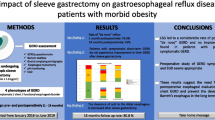Abstract
Background
Laparoscopic sleeve gastrectomy (LSG) is an effective bariatric procedure. However, postprandial symptoms can compromise its beneficial effect. It is not known if a changed gastric emptying and these symptoms are related. This study aimed to assess the association between postprandial symptoms and the gastric emptying pattern after LSG.
Methods
A gastric emptying study with a solid and liquid meal component was performed in the second year after LSG. Before the test, symptoms were assessed using a standardized questionnaire, and during the test, symptoms were scored on a visual analog scale (VAS). Gastric emptying results were expressed as lag phase, half time of gastric emptying (T½), and caloric emptying rate/minute.
Results
Twenty patients (14 F/6 M; age 45.6 ± 7.7 years, weight 93.4 ± 28.2 kg, BMI 31.6 ± 8.1 kg/m2) participated in this study; 13 had a low symptom score (≤9, group I), 7 a high symptom score (≥18, group II). VAS scores for epigastric pain, nausea, and belching were significantly higher in group II. Lag phase (solid) was 6.4 ± 4.5 min in group I, 7.3 ± 6.3 in group II (p = 0.94); T½ (solid) was 40.6 ± 10.0 min in group I, 34.4 ± 9.3 in group II (p = 0.27); caloric emptying rate was 3.9 ± 0.6 kcal/min in group I, 3.9 ± 1.0 kcal/min in group II (p = 0.32).
Conclusions
Patients with postprandial symptoms after LSG reported more symptoms during the gastric emptying study than patients without symptoms. However, there was no difference between gastric emptying characteristics between both groups, suggesting that abnormal gastric emptying is not a major determinant of postprandial symptoms after LSG.

Similar content being viewed by others
References
Kueper MA, Kramer KM, Kirschniak A, et al. Laparoscopic sleeve gastrectomy: standardized technique of a potential stand-alone bariatric procedure in morbidly obese patients. World J Surg. 2008;32(7):1462–5.
Bueno L, Fioramonti J. Neurohormonal control of intestinal transit. Reprod Nutr Dev. 1994;34(6):513–25.
Braghetto I, Davanzo C, Korn O, et al. Scintigraphic evaluation of gastric emptying in obese patients submitted to sleeve gastrectomy compared to normal subjects. Obes Surg. 2009;19(11):1515–21.
Melissas J, Daskalakis M, Koukouraki S, et al. Sleeve gastrectomy—a “food limiting” operation. Obes Surg. 2008;18(10):1251–6.
Shah S, Shah P, Todkar J, et al. Prospective controlled study of effect of laparoscopic sleeve gastrectomy on small bowel transit time and gastric emptying half-time in morbidly obese patients with type 2 diabetes mellitus. Surg Obes Relat Dis. 2010;6(2):152–7.
Baumann T, Kuesters S, Grueneberger J, et al. Time-resolved MRI after ingestion of liquids reveals motility changes after laparoscopic sleeve gastrectomy—preliminary results. Obes Surg. 2011;21(1):95–101.
Howard DD, Caban AM, Cendan JC, et al. Gastroesophageal reflux after sleeve gastrectomy in morbidly obese patients. Surg Obes Relat Dis. 2011;7(6):709–13.
Schweiger C, Weiss R, Keidar A. Effect of different bariatric operations on food tolerance and quality of eating. Obes Surg. 2010;20(10):1393–9.
Keidar A, Appelbaum L, Schweiger C, et al. Dilated upper sleeve can be associated with severe postoperative gastroesophageal dysmotility and reflux. Obes Surg. 2010;20(2):140–7.
Berende CA, de Zoete JP, Smulders JF, et al. Laparoscopic sleeve gastrectomy feasible for bariatric revision surgery. Obes Surg. 2012;22(2):330–4.
Schvarcz E, Palmér M, Aman J, et al. Physiological hyperglycemia slows gastric emptying in normal subjects and patients with insulin-dependent diabetes mellitus. Gastroenterology. 1997;113:60–6.
Siegel JA, Wu RK, Knight LC, et al. Radiation dose estimates for oral agents used in upper gastrointestinal disease. J Nucl Med. 1983;24(9):835–7.
Hunt JN, Smith JL, Jiang CL. Effect of meal volume and energy density on the gastric emptying of carbohydrates. Gastroenterology. 1985;89(6):1326–30.
Farré R, Vanheel H, Vanuytsel T, et al. In functional dyspepsia, hypersensitivity to postprandial distention correlates with meal-related symptom severity. Gastroenterology. 2013;145(3):566–73.
Todkar JS, Shah SS, Shah PS, et al. Long-term effects of laparoscopic sleeve gastrectomy in morbidly obese subjects with type 2 diabetes mellitus. Surg Obes Relat Dis. 2010;6(2):142–5.
Bernstine H, Tzioni-Yehoshua R, Groshar D, et al. Gastric emptying is not affected by sleeve gastrectomy—scintigraphic evaluation of gastric emptying after sleeve gastrectomy without removal of the gastric antrum. Obes Surg. 2009;19(3):293–8.
Trung VN, Yamamoto H, Furukawa A, et al. Enhanced intestinal motility during oral glucose tolerance test after laparoscopic sleeve gastrectomy: preliminary results using cine magnetic resonance imaging. PLoS ONE. 2013;8(6):e65739.
Tzovaras G, Papamargaritis D, Sioka E, et al. Symptoms suggestive of dumping syndrome after provocation in patients after laparoscopic sleeve gastrectomy. Obes Surg. 2012;22(1):23–8.
Papamargaritis D, Koukoulis G, Sioka E, et al. Dumping symptoms and incidence of hypoglycaemia after provocation test at 6 and 12 months after laparoscopic sleeve gastrectomy. Obes Surg. 2012;22(10):1600–6.
Balan K, Sonoda LI, Seshadri N, et al. Clinical significance of scintigraphic rapid gastric emptying. Nucl Med Commun. 2011;32(12):1185–9.
Conflict of Interest
Jan S. Burgerhart, Pim W.J. van Rutte, Michela A. L. Edelbroek, Dirk N.J. Wyndaele, Paul C. van de Meeberg, Peter D. Siersema, and André J.P.M. Smout have no financial or other conflicts of interest related to this publication. Johannes F. Smulders received an educational/research grant, speaker’s fee, and reimbursement clinical immersions, outside the submitted work, from Covidien PLC, Dublin, Ireland.
Statement of Informed Consent
Informed consent was obtained from all individual participants included in the study.
Ethical Approval
All procedures performed in studies involving human participants were in accordance with the ethical standards of the institutional and/or national research committee and with the 1964 Helsinki declaration and its later amendments or comparable ethical standards.
Author information
Authors and Affiliations
Corresponding author
Rights and permissions
About this article
Cite this article
Burgerhart, J.S., van Rutte, P.W.J., Edelbroek, M.A.L. et al. Association Between Postprandial Symptoms and Gastric Emptying After Sleeve Gastrectomy. OBES SURG 25, 209–214 (2015). https://doi.org/10.1007/s11695-014-1410-z
Published:
Issue Date:
DOI: https://doi.org/10.1007/s11695-014-1410-z




